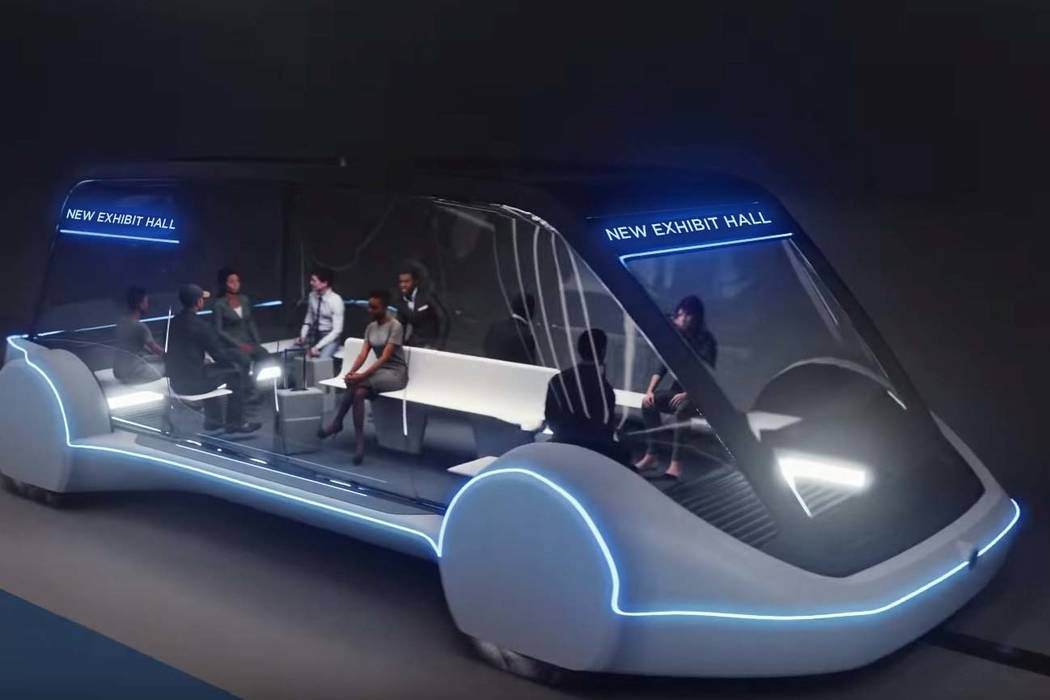LVCVA moving ahead with underground transport system
The Las Vegas Convention and Visitors Authority is going underground.
The organization’s board of directors on Tuesday approved a proposal with Elon Musk’s The Boring Co. to develop a subterranean people-moving transit system costing between $35 million and $55 million for the Las Vegas Convention Center in a 10-3 vote.
Las Vegas Mayor Carolyn Goodman, Councilwoman Michele Fiore and Caesars Entertainment Corp. executive Tom Jenkin opposed the motion because they wanted more time to vet the project.
The final cost will be set when engineers determine the routes and the number of stations that would be built.
While the project approved by the board would serve only the Las Vegas Convention Center campus, representatives of The Boring Co. say the system could be expanded to serve other destinations in the community, including downtown Las Vegas, the Strip, the Las Vegas Stadium and McCarran International Airport.
Proposed route options would run from the Convention Center’s Green Lot east of the South Hall to a new parking area west of the West Hall currently under construction, a distance of more than 1¼ miles.
Autonomous point-to-point system
LVCVA President and CEO Steve Hill and Steve Davis, president of The Boring Co., described what’s being called the Las Vegas Convention Center Loop as an autonomous point-to-point, on-demand system with vehicles capable of transporting up to 16 people at a time.
The system would use autonomous electric vehicles, or AEVs, on three types of Tesla Model X chassis operated in automatic pilot mode.
Using paired one-way tunnels with a series of on- and off-ramps, the AEVs could be hailed by app for direct service to another station. Conventioneers would access the underground system by elevators, escalators or stairs. Hill said the LVCVA envisions use of the Convention Center Loop to be free to conventioneers.
While the system is capable of speeds of up to 150 mph, the short distance between stations would keep a vehicle’s speed at a maximum of around 50 mph.
According to LVCVA documents, pre-cast concrete tunnels would be built about 30 feet below grade level with a 12-foot inner diameter and a 13½-foot outer diameter.
During construction, six segments would be configured to form one 5-foot tunnel ring so a one-mile segment of tunnel would require 1,056 rings. Segments would be reinforced with steel fibers along with monofilament polypropylene for fire resistance and concrete longevity. Packing material and gaskets would be adhered to the segments prior to installation to alleviate seismic loads and water and gas intrusion.
The case for delaying
While LVCVA executives were directed to negotiate a contract with the company that likely will be brought to the board in the summer, Goodman, Fiore and Jenkin made a case for delaying the vote for a month so they could study the proposal more closely.
“I believed the board would be presented with options and documented success stories to consider when selecting this all-important contract,” Goodman said. “Therefore, I’m a bit perplexed as to how the (request for proposals) for this critical service was issued so quietly and contract recipients selected without any full briefing to multiple members of this board.
“This type of final decision-making has come to characterize decision-making at LVCVA as of late and is not transparent nor conducive to this board,” Goodman said. “The selection and exploration process of any transportation contract must be seriously scrutinized and must include exploration of tested and true innovative models like those that already exist in Denver, China, Beijing Metro and South Korea.”
Hill told Goodman that the LVCVA received nine inquiries that resulted in six companies responding to the request for proposals. Of those six, The Boring Co.’s proposal was the only one that was affordable based on the amount of money the LVCVA had dedicated to an on-campus transit system, he said.
The biggest cost savings would come in boring the tunnels. The company has indicated it could provide tunnels at a rate of about $10 million per mile. Subway tunnels in other cities cost as much as $750 million to $1 billion per mile to bore according to the company’s website.
Proposals in L.A., Chicago
Goodman also expressed skepticism in the company’s ability to deliver the project. She noted that The Boring Co., which has a two-mile underground test track in Hawthorne, California, has proposed a project known as “The Dugout Loop,” a tunnel from land owned by the company to Dodger Stadium, a trip that would take four minutes.
It also has proposed a 17-mile tunnel linking downtown Chicago with O’Hare International Airport.
Neither project has been started.
Hill said part of the appeal of the Boring proposal is that the company would finance and build the project for a set price paid when it’s completed. He also noted that convention space or access to the Convention Center wouldn’t be affected because all construction work would be underground.
Contact Richard N. Velotta at rvelotta@reviewjournal.com or 702-477-3893. Follow @RickVelotta on Twitter.
Other LVCVA business The LVCVA board of directors also: -Approved a collaboration of Klai Juba Wald and Design Las Vegas to be architects of record for the third and final phase of the Convention Center renovation project, which involves two years of renovations to the North, Central and South halls beginning in 2021. Administrators will now negotiate a professional services contract. -Approved a three-year contract extension with Cox Nevada Telecom LLC for telecommunication services for the Convention Center. The extension, which will run from September 2020 to September 2023, will produce projected annual revenue of $5.5 million to the LVCVA and Cox has committed to spending $10 million over the period to upgrade wireless network services. -Agreed to spend $290,000 over two fiscal years in collaboration with the High Lantern Group, Simpleview and R&R Partners to redesign the LVCVA website.























